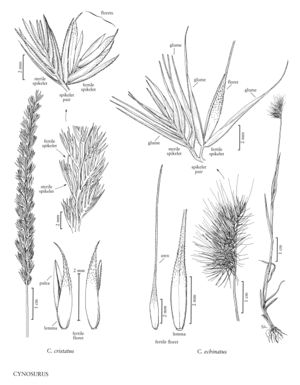Difference between revisions of "Cynosurus cristatus"
FNA>Volume Importer |
imported>Volume Importer |
||
| (6 intermediate revisions by 2 users not shown) | |||
| Line 16: | Line 16: | ||
-->{{Treatment/Body | -->{{Treatment/Body | ||
| − | |distribution=Mont.;Oreg.;Conn.;N.J.;N.Y.;Wash.;Del.;Wis.;W.Va.;N.H.;N.C.;Tenn.;Pa.;R.I.;B.C.;Nfld. | + | |distribution=Mont.;Oreg.;Conn.;N.J.;N.Y.;Wash.;Del.;Wis.;W.Va.;N.H.;N.C.;Tenn.;Pa.;R.I.;B.C.;Nfld. and Labr. (Labr.);N.S.;Ont.;Que.;Va.;Colo.;Calif.;Vt.;Idaho;Maine;Md.;Mass.;Ohio;Mich. |
|discussion=<p><i>Cynosurus cristatus</i> is a European native that is now established in North America. It grows in a wide range of soils in dry or damp habitats. In Europe it is used for fodder and pasture, especially for sheep, but in North America it is regarded as a weedy species. It is self-incompatible.</p> | |discussion=<p><i>Cynosurus cristatus</i> is a European native that is now established in North America. It grows in a wide range of soils in dry or damp habitats. In Europe it is used for fodder and pasture, especially for sheep, but in North America it is regarded as a weedy species. It is self-incompatible.</p> | ||
|tables= | |tables= | ||
| Line 26: | Line 26: | ||
-->{{#Taxon: | -->{{#Taxon: | ||
name=Cynosurus cristatus | name=Cynosurus cristatus | ||
| − | |||
|authority=L. | |authority=L. | ||
|rank=species | |rank=species | ||
| Line 33: | Line 32: | ||
|basionyms= | |basionyms= | ||
|family=Poaceae | |family=Poaceae | ||
| − | |distribution=Mont.;Oreg.;Conn.;N.J.;N.Y.;Wash.;Del.;Wis.;W.Va.;N.H.;N.C.;Tenn.;Pa.;R.I.;B.C.;Nfld. | + | |illustrator=Sandy Long |
| + | |illustration copyright=Utah State University | ||
| + | |distribution=Mont.;Oreg.;Conn.;N.J.;N.Y.;Wash.;Del.;Wis.;W.Va.;N.H.;N.C.;Tenn.;Pa.;R.I.;B.C.;Nfld. and Labr. (Labr.);N.S.;Ont.;Que.;Va.;Colo.;Calif.;Vt.;Idaho;Maine;Md.;Mass.;Ohio;Mich. | ||
|reference=None | |reference=None | ||
|publication title= | |publication title= | ||
|publication year= | |publication year= | ||
|special status= | |special status= | ||
| − | |source xml=https:// | + | |source xml=https://bitbucket.org/aafc-mbb/fna-data-curation/src/200273ad09963decb8fc72550212de541d86569d/coarse_grained_fna_xml/V24/V24_969.xml |
|subfamily=Poaceae subfam. Pooideae | |subfamily=Poaceae subfam. Pooideae | ||
|tribe=Poaceae tribe Poeae | |tribe=Poaceae tribe Poeae | ||
Latest revision as of 16:26, 11 May 2021
Plants perennial; cespitose, not rhizomatous. Culms (5)15-75 (90) cm. Sheaths smooth, glabrous; ligules 0.5-2.5 mm, truncate, erose or ciliolate; blades 3-15(19) cm long, 0.5-2(4.3) mm wide, glabrous or pubescent. Panicles (1) 3.5-14 cm long, 0.4-1 cm wide, linear, spikelike, unilateral. Spikelets 3-7 mm, subsessile or shortly pedicellate, pedicels to 1 mm. Sterile spikelets strongly laterally compressed, with 6-11(18) florets; glumes and lemmas similar, linear-lanceolate, keeled, keels ciliate, apices acuminate to awned, awns to 1 mm. Fertile spikelets with 2-5 florets, glumes and lemmas dissimilar; glumes 2.8-5.1 mm long, 0.6-0.9 mm wide, 1-veined, laterally compressed, hyaline, keeled, acute; rachilla internodes 0.4-0.6 mm; lemmas 3-4.5 mm long, 0.6-1.1 mm wide, dorsally compressed, membranous to subcoriaceous, not keeled, margins hyaline, ciliolate, apices obtuse to acute, unawned or awned, awns to 3 mm; anthers 1.8-3 mm. 2n = 14.
Distribution
Mont., Oreg., Conn., N.J., N.Y., Wash., Del., Wis., W.Va., N.H., N.C., Tenn., Pa., R.I., B.C., Nfld. and Labr. (Labr.), N.S., Ont., Que., Va., Colo., Calif., Vt., Idaho, Maine, Md., Mass., Ohio, Mich.
Discussion
Cynosurus cristatus is a European native that is now established in North America. It grows in a wide range of soils in dry or damp habitats. In Europe it is used for fodder and pasture, especially for sheep, but in North America it is regarded as a weedy species. It is self-incompatible.
Selected References
None.
